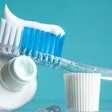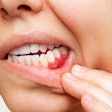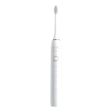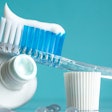
Dr. Alvin Danenberg's patients often ask him about mouthwash and mouthrinses. They want to know if mouthwash kills bacteria. But then they ask if bacteria can cause gum disease and how can they get or keep healthy gums. This is an opportunity to have an in-depth conversation about your patient's health.
 Alvin Danenberg, DDS.
Alvin Danenberg, DDS.Yes, I tell them antibacterial mouthwash kills bacteria. Yes, bacteria can cause gum disease. Yes, you should want healthy gums.
But you know that bacteria serve many purposes in the mouth, when the good bacteria balance out the bad kinds. Healthy gums are dependent on a healthy balance of bacteria. One underrated bacterial benefit is to allow a specific pathway of digestion to occur that is critical for health.
Mouth bacteria
When bacteria are killed indiscriminately, both harmful and good bacteria are killed, and the mouth's delicate balance of bacteria goes awry. This means that tooth decay and gum disease may be more likely to occur.
To address their concerns, I talk with my patients about the benefits of mouth bacteria and the unique role they play in the chemical pathway of certain foods. Specifically, the chemical pathway of "nitrate-to-nitrite-to-nitric oxide" is dependent on specific anaerobic bacteria in the mouth.
The pathway
Nitrates are naturally abundant in certain vegetables. They are converted into nitrites and then into nitric oxide and other nitrogen products during digestion. One end product, which is nitric oxide, has major benefits throughout the body. It reduces blood pressure, reduces the risk of cardiovascular disease, improves athletic performance, and improves gum health, to name a few. Mouth bacteria play an important role in the path of creating nitric oxide.
The pathway goes like this: The foods that are high in natural nitrates are chewed up in our mouths and swallowed. Nitrates are absorbed in our stomach and upper small intestine. A large percentage of the absorbed nitrates get concentrated into our saliva. Once nitrates are in our saliva, the naturally occurring anaerobic bacteria on our tongues convert these nitrates into nitrites. Then we swallow.
The nitrites then go into our guts. Some nitrites are changed into nitric oxide by the acids in our stomach. Some is absorbed into our blood system and circulates to all of our cells where nitric oxide is formed. Still, some nitrites are converted into nitric oxide by bacteria in our intestines. There are many biological ways that nitrites are converted into nitric oxide and other nitrogen products.
In the mouth, nitric oxide has significant effects. Nitric oxide gets into the gum tissues and is strongly anti-inflammatory. It also has antimicrobial effects on pathogens. In a 2016 randomized, double-blinded clinical trial, nitric oxide derived from salivary nitrates helped reduce gingivitis (Journal of Clinical Periodontology, July 2016, Vol. 43:7, pp. 603-608).
Don't kill the bacteria
So I tell my patients, if you kill the bacteria in your mouth and on your tongue with antiseptic mouthwash, salivary nitrates wouldn't be converted into nitrites. With less nitrites in your system, you would produce less beneficial nitric oxide.
They naturally then ask, if nitrates are healthy, then what foods are the best sources? Here are some vegetables with the highest concentrations of naturally occurring nitrates. These vegetables are part of a nutrient-dense diet I recommend:
- Arugula
- Spinach
- Butter leaf and oak leaf lettuces
- Swish chard
- Beets and beet greens
I make sure to differentiate between healthy nitrates and the artificial nitrates and nitrites that are added to processed meats and other foods. These are not healthy and should be avoided. Their chemistry is different from that of naturally occurring nitrates.
The short way of saying this is that I tell my patients to eat foods that are high in natural nitrates and that they should not use any mouthwash that can disturb the natural and healthy balance of bacteria in their mouth.
A version of this column first ran on Dr. Danenberg's blog. DrBicuspid.com appreciates the opportunity to reprint it. Future columns will address how dentists can serve their patients and their profession.
Alvin Danenberg, DDS, practices at the Bluffton Center for Dentistry in Bluffton, SC. He is also on the faculty of the College of Integrative Medicine and created its integrative periodontal teaching module. He also spent two years as chief of periodontics at Charleston Air Force Base earlier in his career. His website is drdanenberg.com.
The comments and observations expressed herein do not necessarily reflect the opinions of DrBicuspid.com, nor should they be construed as an endorsement or admonishment of any particular idea, vendor, or organization.


















